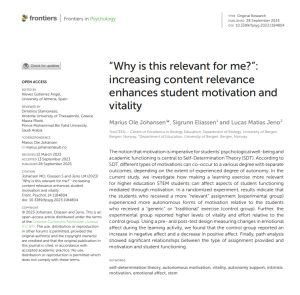New Project Alert: Gjennomføring 2023!
A new bioCEED-initiated research project, “Gjennomføring 2023” (G23), has as its main purpose to understand psycho-social (e.g., sense of belonging) and experiential (e.g., welcome week, specific courses) levers to retention in the Faculty of Mathematics and Natural Sciences (MatNat). In short, when student leave, why do they leave? When they stay, why do they stay? And, critically, what can we—as educators, advisors, and administrators—do to promote student retention?
The G23 project is a five-year research project where we will follow the 2023 cohort (new students in 2023) to learn more about the student experience at the MatNat faculty, the choices the students make, and how staff and lecturers can create the best possible learning environment for our students. “We,” specifically, are Sehoya Cotner, Oddfrid Førland, Sigrunn Eliassen, and Kjartan Refvik.
We began Gjennomføring by asking incoming MatNat students to consent to participate in the project. Over 400 students gave us consent to use their welcome week survey data, and almost 200 students agreed to be contacted, as part of G23, over the next five years.
We sent out our first survey at the end of the second week of the semester. We only asked three questions: (1) Are you satisfied with your first two weeks?; (2) What has been most positive?; and (3) What has been most challenging. A quick, chatGPT-assisted assessment of these initial survey results indicated that most students are satisfied (51%) or very satisfied (28%) with their first two weeks.
When asked about the most positive aspects of their first two weeks at the University, the top five themes are:
1. Social Environment and Making New Friends:
Students frequently mention enjoying the social environment and the opportunity to meet and become acquainted with their peers. They emphasize the importance of meeting people with similar interests and how this has enriched their initial university experience. They like the friendly and inclusive atmosphere, indicating that this has made the transition to university smoother.
2. Fadderuke/Mentor Program:
Many comments refer to “Fadderuken” and mentor program as a highlight. The welcome week is organized to help new students acclimate to university life, offering social events and activities designed to facilitate making connections. Students appreciate the inclusive, helpful, and friendly mentors, emphasizing their role in creating a positive start to university life.
3. Quality of Teaching and Academic Content:
Students also express satisfaction with the quality of the lectures, the lecturers, and the content of the courses. Some say that the courses have been interesting, the professors are knowledgeable, and that they are looking forward to delving deeper into their studies. They appreciated the engagement and professionalism of their instructors.
4. Information and Orientation:
Several students appreciate the practical information they have received, which has helped them navigate the new environment. This includes orientation sessions and a clear presentation of academic content, which has made the start smoother and more manageable for them.
5. Freedom and Responsibility:
Some students also mention enjoying the increased freedom and responsibility that comes with university studies, including the ability to create their own routines and the opportunity to engage in subjects they are passionate about.
When asked about the most challenging aspects of their first two weeks at the University, the top five themes are:
1. Academic Challenges:
Many students mentioned a significant transition from VGS to the university, with mathematics cited as being especially challenging. Students also noted the overwhelming amount of work and the quick pace of the curriculum, making it hard for them to keep up.
2. Adapting to University Life:
A lot of comments reflected the challenges of adapting to student life and establishing new routines. Some students have found it hard to balance their studies with their free time and other commitments. Adjusting to new teaching methods and navigating between different buildings were also noted as challenges.
3. Social Challenges:
Several students mentioned some difficulty in forming new friendships or fitting into social groups. Events during the welcome week were described as intense, and may lead to a superficial socializing experience for some. Some students do not consume alcohol in social situations, and expressed concern that that would be socially problematic.
4. Self-Responsibility and Independence:
Students felt the weight of having to take greater responsibility for their own learning and manage their time effectively. Some expressed challenges with self-study and creating effective study routines. The newfound freedom regarding class attendance presented a challenge to some students who worry about having the necessary self-discipline.
5. Practical Challenges:
Students noted logistical and practical challenges, like keeping track of different professors’ methods, managing multiple platforms like “One Drive”, and dealing with sickness during crucial times. Some mentioned the struggle to manage daily chores like cooking while on a budget. Finally, a few students mentioned challenges specifically with courses taught in English.
As this project proceeds, we will share our findings with faculty leaders and instructors. Our aim is to identify areas where we can make changes that make the transition to university life as positive as possible. And of course, we will be seeking funding to delve further into this work.




